Linux下MySQL/MariaDB Galera集群搭建过程
Posted hch的随笔 成功的秘诀在于恒心—迪斯雷利
tags:
篇首语:本文由小常识网(cha138.com)小编为大家整理,主要介绍了Linux下MySQL/MariaDB Galera集群搭建过程相关的知识,希望对你有一定的参考价值。
MariaDB介绍
MariaDB是开源社区维护的一个mysql分支,由MySQL的创始人Michael Widenius主导开发,采用GPL授权许可证。
MariaDB的目的是完全兼容MySQL,包括API和命令行,使之能轻松成为MySQL的代替品。
详细介绍请参考链接:
Galera Cluster介绍
Galera Cluster是基于MySQL/innodb二次开发而成的一个支持“多主同步”的数据库主从集群,具有高可用,易于扩展等特点。
详细介绍请参考链接:
http://www.gpfeng.com/?p=603&utm_source=tuicool&utm_medium=referral
本文使用的Linux发行版:CentOS6.7 下载地址:https://wiki.centos.org/Download
1. 添加yum源
[root@localhost ~]# vi /etc/yum.repos.d/CentOS-MariaDB.repo
添加如下几行:
[mariadb] name = MariaDB baseurl = http://yum.mariadb.org/5.5/rhel6-amd64 gpgkey = https://yum.mariadb.org/RPM-GPG-KEY-MariaDB gpgcheck = 1
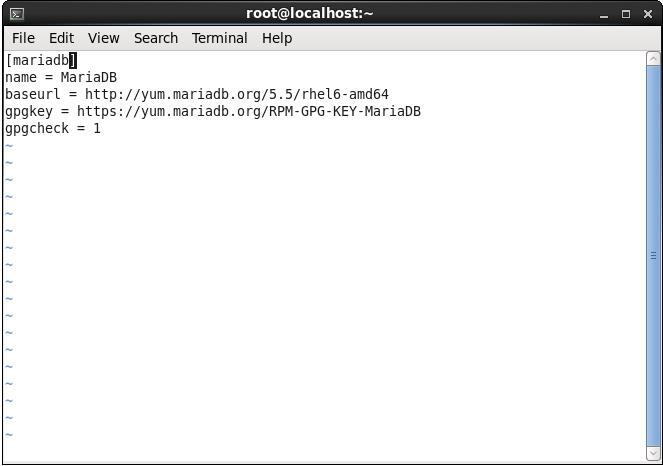
2. 安装mariadb galera软件包
[root@localhost ~]# yum install MariaDB-Galera-server MariaDB-client galera
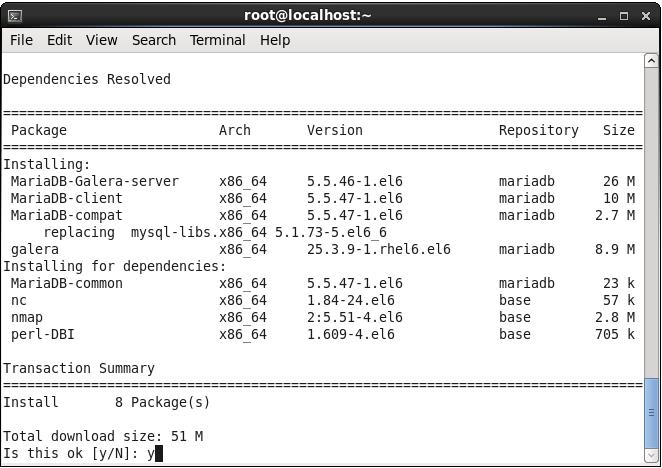
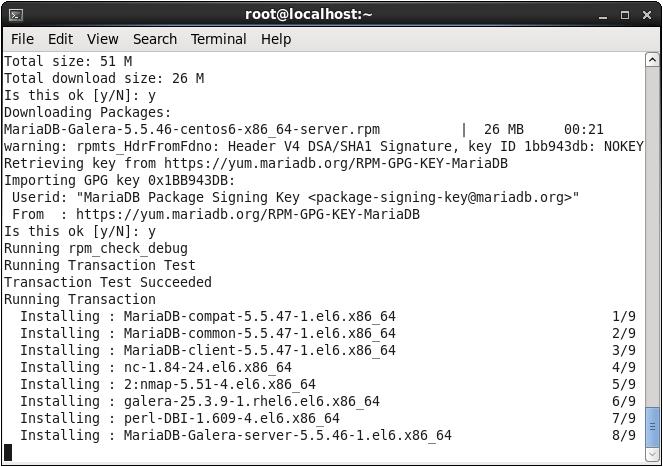
3. 修改防火墙配置
[root@localhost ~]# vi /etc/sysconfig/iptables
添加如下几行:
-A INPUT -m state --state NEW -m tcp -p tcp --dport 3306 -j ACCEPT -A INPUT -m state --state NEW -m tcp -p tcp --dport 4444 -j ACCEPT -A INPUT -m state --state NEW -m tcp -p tcp --dport 4567 -j ACCEPT -A INPUT -m state --state NEW -m tcp -p tcp --dport 4568 -j ACCEPT
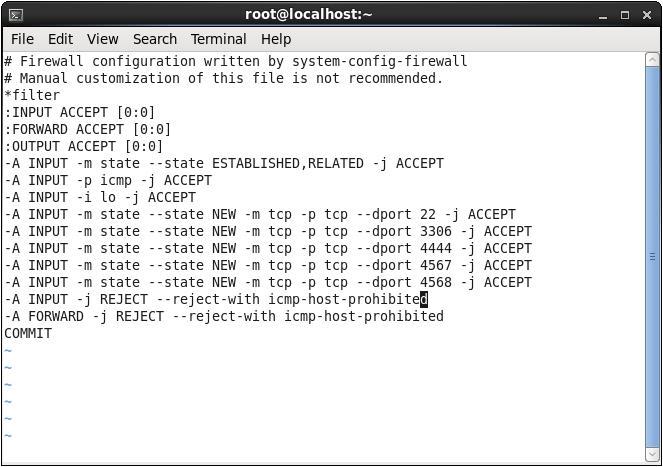
4. 重启防火墙功能
[root@localhost ~]# service iptables restart
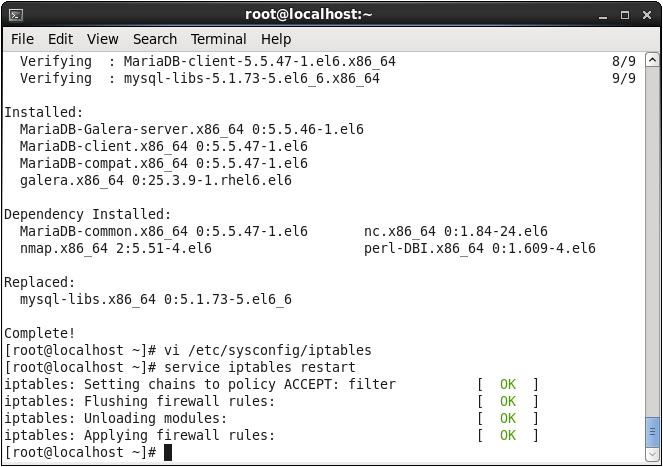
5. 安装selinux管理工具
[root@localhost ~]# yum provides /usr/sbin/semanage
[root@localhost ~]# yum -y install policycoreutils-python
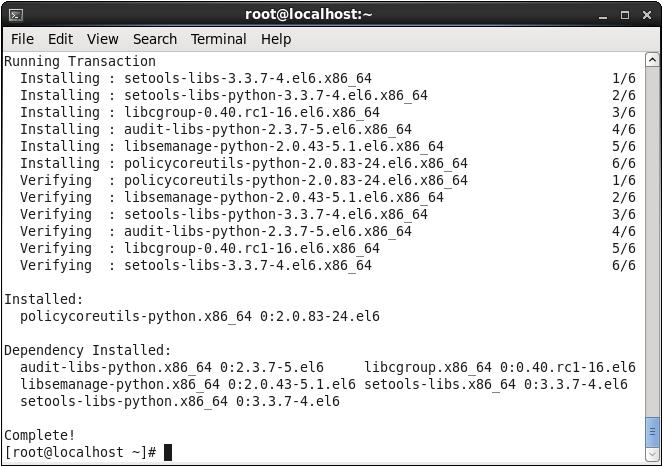
6. 修改selinux安全策略
[root@localhost ~]# semanage port -a -t mysqld_port_t -p tcp 4567
[root@localhost ~]# semanage port -a -t mysqld_port_t -p tcp 4568
[root@localhost ~]# semanage permissive -a mysqld_t
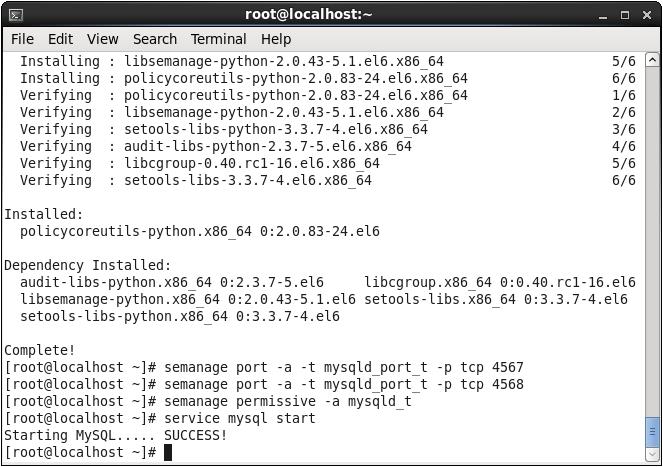
7. 启动mysql服务
[root@localhost ~]# service mysql start
8. 执行mysql安全设置
[root@localhost ~]# mysql_secure_installation
(先设置root账户密码,再一直“y”下去即可)
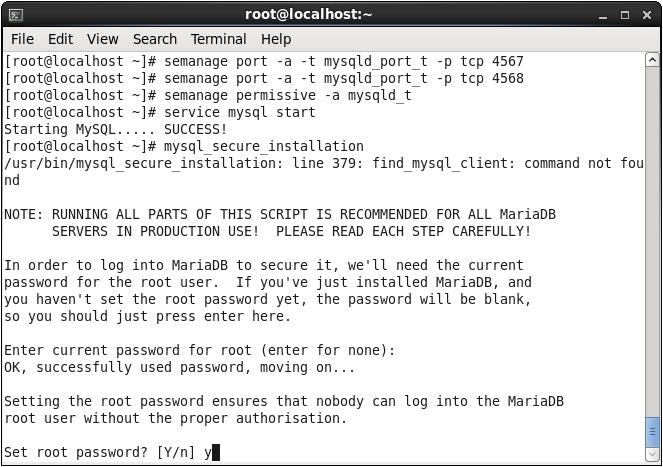
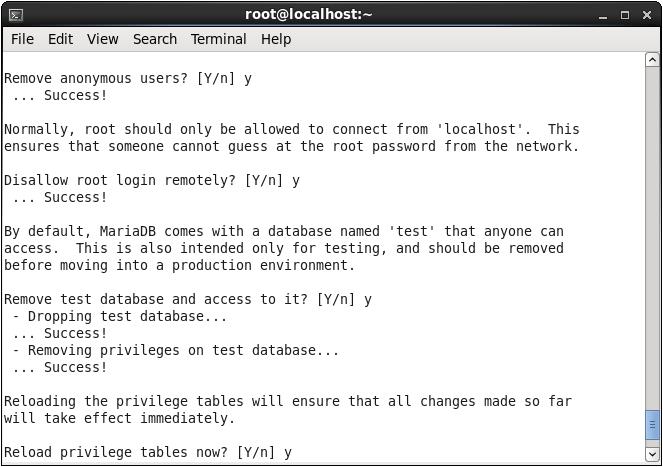
9. 创建用于节点同步的账号
[root@localhost ~]# mysql -uroot -p
MariaDB [(none)]> grant usage on *.* to sst@\'%\' identified by \'123456\';
MariaDB [(none)]> flush privileges;
10. 修改mysql默认字符集
MariaDB [(none)]> show variables like \'character%\';
MariaDB [(none)]> set character_set_server = utf8;
MariaDB [(none)]> set character_set_database = utf8;
11. 修改集群节点配置
[root@localhost ~]# cp /usr/share/mysql/wsrep.cnf /etc/my.cnf.d/
[root@localhost ~]# vi /etc/my.cnf.d/wsrep.cnf
修改如下几行:
wsrep_provider=/usr/lib64/galera/libgalera_smm.so wsrep_cluster_address="gcomm://" #集群节点N的地址(注意把前面的"#"删掉!) wsrep_sst_auth=sst:123456 #节点N的数据库账户和密码
- 参数说明
"gcomm://" 是特殊的地址,仅仅是galera cluster初始化启动时候使用。
如果集群启动以后,我们关闭了第一个节点,那么再次启动的时候必须先修改"gcomm://"为其他节点的集群地址,例如wsrep_cluster_address="gcomm://192.168.0.152"。
检查/etc/my.cnf中有没有!includedir /etc/my.cnf.d/这一行,没有则添加。
[root@localhost ~]# vi /etc/my.cnf
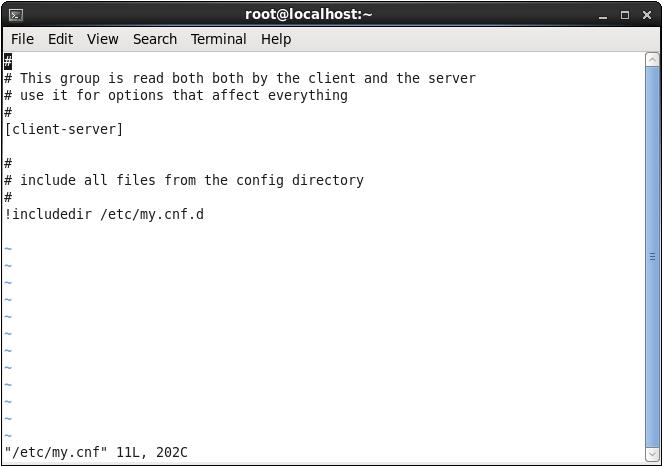
到这里,第1个节点的配置就完成了,然后在另一台主机上按照步骤1~11配置第2个节点,只需修改节点2的wsrep_cluster_address为节点1的IP即可,以此类推。
12. 启动集群节点
- 检查mysql进程:[root@localhost ~]# ps aux|grep mysql
- 停止mysql服务:[root@localhost ~]# service mysql stop
- 启动第1个节点:[root@localhost ~]# service mysql bootstrap
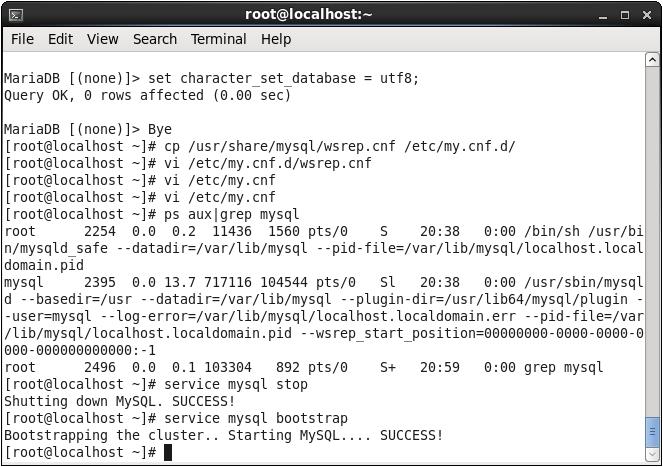
- 启动第2、3、...个节点:[root@localhost ~]# service mysql start
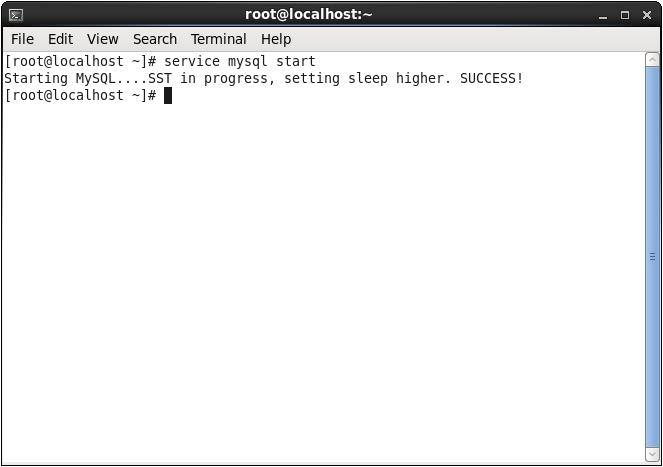
(注意:启动mysql之前先检查一下服务是否已经启动,不要重复启动,如果无法停止当前mysql服务则手动kill掉mysql的进程)
13. 检查集群运行状态
[root@localhost ~]# mysql -uroot -p
MariaDB [(none)]> show status like \'wsrep%\';
如果wsrep_connected=ON且wsrep_ready=ON则说明节点成功接入集群。
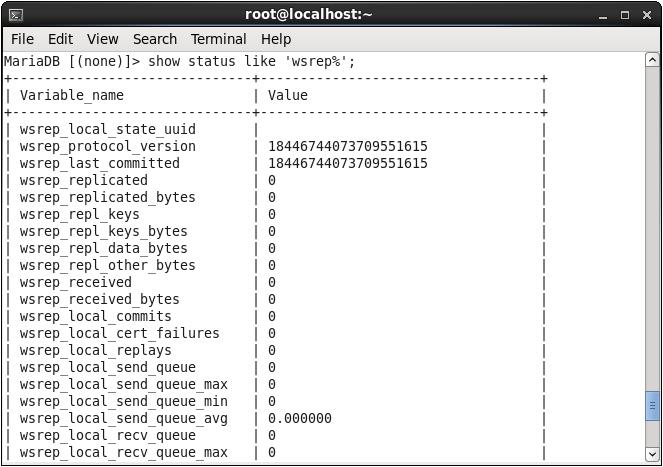
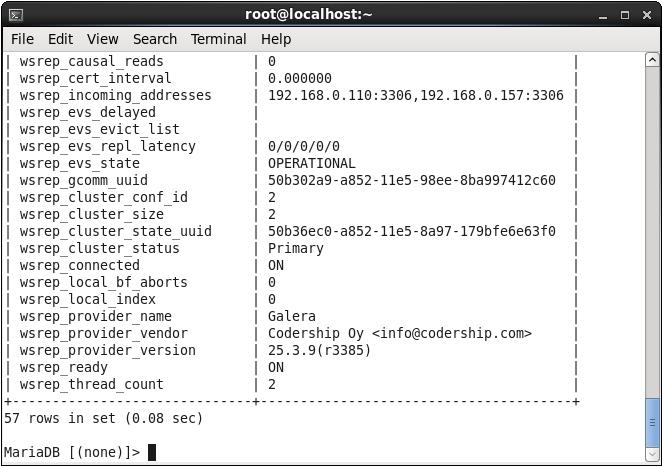
14. 配置集群的仲裁节点
对于只有2个节点的galera cluster和其他集群软件一样,需要面对极端情况下的“脑裂”状态。为了避免这种问题,galera引入了“arbitrator(仲裁人)”。
“仲裁人”节点上没有数据,它在集群中的作用就是在集群发生分裂时进行仲裁,集群中可以有多个“仲裁人”节点。将“仲裁人”节点加入集群的方法很简单,运行如下命令即可:
[root@localhost ~]# garbd -a gcomm://<节点IP> -g my_wsrep_cluster -d
- 参数说明
-a 集群地址
-g 集群名称
-d 以daemon模式运行
15. 检查数据库是否符合要求
部署到集群之前,建议先检查数据库是否符合galera的要求,比如存储引擎必须是innodb、数据表必须有主键等,否则记录将不会在多台复制。
选择指定的数据库,执行以下SQL输出不符合要求的表及其原因,根据相应的原因修改即可:
select distinct concat( t.table_schema, \'.\', t.table_name ) as tbl, t. engine,
if ( isnull(c.constraint_name), \'nopk\', \'\' ) as nopk,
if ( s.index_type = \'fulltext\', \'fulltext\', \'\' ) as ftidx,
if ( s.index_type = \'spatial\', \'spatial\', \'\' ) as gisidx
from information_schema. tables as t
left join information_schema.key_column_usage as c
on ( t.table_schema = c.constraint_schema and t.table_name = c.table_name and c.constraint_name = \'primary\' )
left join information_schema.statistics as s
on ( t.table_schema = s.table_schema and t.table_name = s.table_name and s.index_type in (\'fulltext\', \'spatial\'))
where t.table_schema not in ( \'information_schema\', \'performance_schema\', \'mysql\' ) and t.table_type = \'base table\'
and ( t.engine <> \'innodb\' or c.constraint_name is null or s.index_type in (\'fulltext\', \'spatial\'))
order by t.table_schema, t.table_name;
16. 常见问题
1)启动mysql时出错:SST in progress, setting sleep higher. ERROR!
- 确保本机已安装rsync:[root@localhost ~]# yum list|grep rsync
- 确保已允许galera sst使用的端口4444、4567、4568通过防火墙并重启防火墙功能
- 确保selinux已对端口4444开放权限:[root@localhost ~]# semanage port -a -t mysqld_port_t -p tcp 4444
2)查看galera集群状态时wsrep_connected和wsrep_ready的值均为OFF!
打开/etc/my.cnf.d/wsrep.cnf文件,找到wsrep_cluster_address="gcomm://"这一行,检查前面是否有"#",如果有则删掉并重启mysql。
转自
Linux下MySQL/MariaDB Galera集群搭建过程 - 无心码农 - 博客园
http://www.cnblogs.com/liujiduo/p/5066803.html
MariaDB Galera Cluster集群优缺点_mailrun_新浪博客
http://blog.sina.com.cn/s/blog_548c8a830102vrgw.html
以上是关于Linux下MySQL/MariaDB Galera集群搭建过程的主要内容,如果未能解决你的问题,请参考以下文章
